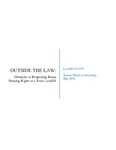Outside the Law: Obstacles to Respecting Roma Housing Rights at a Toxic Landfill (thesis)

View/
Author
Scott, Kassie Ann
Subject
Washington and Lee University -- Honors in Sociology
Housing policy
Hazardous waste sites
Romanies -- Social conditions
Metadata
Show full item recordDescription
Thesis; [FULL-TEXT RESTRICTED TO WASHINGTON AND LEE UNIVERSITY LOGIN] Kassie A. Scott is a member of the Class of 2018 of Washington and Lee University. Nearly 2,000 people live at the site of a toxic landfill known as Pata-Rât in Cluj-Napoca, Romania. Around 42 percent of the people who live at Pata-Rât were evicted to the site by local authorities. Additionally, approximately 80 percent are Roma and 40 percent are children. Many of these children and their families live in makeshift houses without access to running water, electricity, or even clean air. Though some of the people living at the landfill have engaged in collective action to fight for their rights, the housing crisis still persists. My thesis asks why. I use field theory (Fligstein and McAdam 2012) to examine actions taken by the state, nongovernmental organizations, and individuals at the landfill. To begin with, a strategic action field emerged in 2011 when a coalition known as the Working Group of Civil Society Organizations (gLOC) first formed. This strategic action field destabilized in 2014 with the creation of a new project, which was funded by Norwegian donors, called the Pata-Cluj Project. The Pata-Cluj Project not only derailed the movement for housing rights but also depoliticized the housing crisis at Pata-Rât. Still today local authorities continue to deny responsibility for the housing crisis by refusing to change the city's social housing policy and by sending locals who live at the landfill to nongovernmental organizations for help. Some of these nongovernmental organizations such as the Foundation for People's Development (FDP) and the ProRroma Foundation act as patrons who create dependency among people at the landfill, while other organizations such as gLOC and Foundation Desire act as vehicles for mobilization. Even when organizations act as vehicles for mobilization, residents at the landfill may still choose not to participate in collective action. This may be due to the fact that the landfill serves not only as a place to live but also a place to work. In other words, relocating the people who currently live at Pata-Rât could result in unemployment for individuals who sort the garbage to survive. If the movement for housing rights hopes to succeed, then constituents will likely have to address the right to work and the right to housing. Additionally, the organizations who work at Pata-Rât could be more effective if they chose to cooperate rather than engage in conflict. Finally, the movement should be led by Roma, for Roma. Kassie Scott